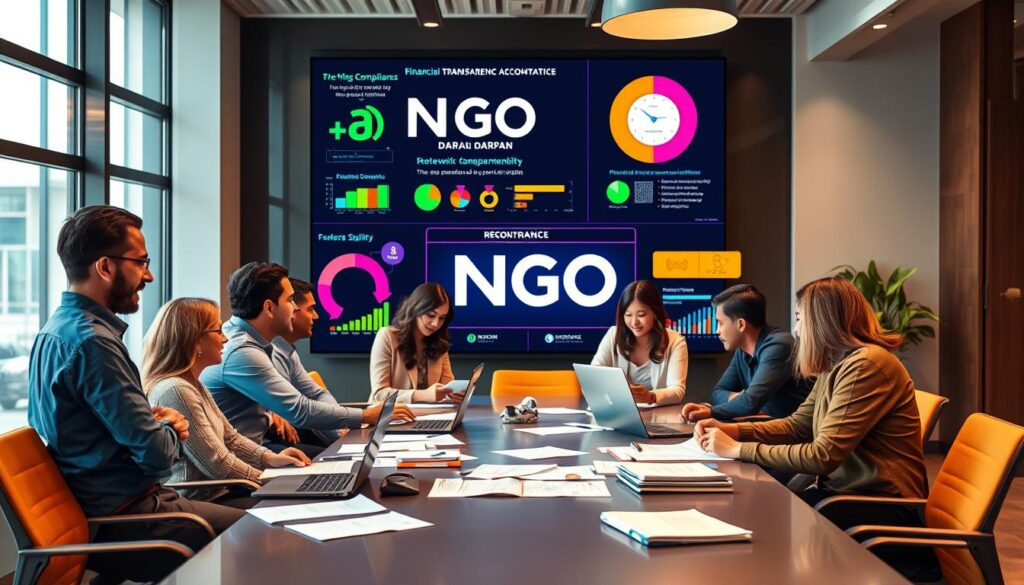Did you know over 80% of non-profits in India can get tax exemptions? Yet, many don’t register for 12A and 80G. These registrations are key for NGOs, trusts, and religious groups. They open doors to credibility, government funds, and tax perks for donors.
12A registration gives tax breaks to non-profits, helping them focus on their missions. 80G lets donors deduct their gifts from taxes, drawing in more support. It’s vital to know how these certificates help to boost your group’s work and keep it financially strong.
Skipping these steps means missing out on donations and funds crucial for your work. 12A offers a lifetime benefit, providing steady advantages. We’ll explore the perks of 12A and 80G, the steps to get them, and what makes each special.
Register your NGO in 12A, 80G and Niti Aayog at Just ₹ 7999/-
Key Takeaways
- Registering under 12A and 80G brings big tax breaks.
- 12A makes your income tax-free.
- 80G lets donors deduct their gifts, boosting donations.
- Both registrations last your NGO’s lifetime, offering steady benefits.
- Knowing who can apply and what documents you need is key.
- Not registering can mean missing out on important funds.
- Not renewing 80G can slow down donations.
Understanding 12A Registration
12A registration is key for non-profit groups in India. It helps them get tax breaks on their earnings. This lets groups like trusts, societies, and Section 8 companies use their funds for charity without paying income tax. To understand what is the purpose of 12A registration?, knowing the rules is crucial.
What is the purpose of 12A registration?
The main goal of 12A registration is to let non-profits not pay income tax on money used for charity. With this, they can put more money towards helping their communities. This tax-free status helps them make a bigger difference and keeps them running smoothly.
Eligibility criteria for 12A registration
To be eligible for 12A registration, groups must be non-profits and use their income for charity. Here are the main points:
- Non-profit groups like trusts, societies, or Section 8 companies.
- Proof that income goes to charity.
- Keeping detailed financial records.
- Submitting documents like the trust deed, PAN, and Form 10A.
Meeting these rules keeps groups in line and lets them keep their tax-free status. It’s key to follow these rules to keep the benefits of 12A registration.
| Criteria | Details |
|---|---|
| Type of Organization | Trusts, societies, Section 8 companies |
| Purpose of Income | To be solely used for charitable activities |
| Required Documents | Trust deed, PAN, Form 10A |
| Record Maintenance | Accurate financial records must be kept |
Exploring 80G Registration
Getting to know 80G registration is key for groups wanting to boost their fundraising. This process helps by giving donors tax breaks for their gifts to non-profits. With 80G registration, groups can get more funds.
What is the purpose of 80G registration?
The main goal of 80G registration is to make giving easier by offering tax breaks. Groups with this registration draw more donors, leading to bigger gifts. These tax breaks encourage people to give more, helping society.
Eligibility requirements for 80G registration
To get 80G registration, a group must first get 12A registration. This shows the group does real charity work. They also need to keep detailed financial records, like donor info and spending proofs. Following these rules helps groups stay legal and helps donors too.
Benefits of 12A and 80G Registration
Registering your group under Sections 12A and 80G brings big perks. It makes your group more financially stable and gets more people to support you. You can use the saved money for charity and follow the Income Tax Act rules.
Tax exemption for organizations
Groups with a Section 12A registration get tax exemptions for organizations. This lets you use money saved from taxes for social projects. It makes your work more effective by easing your financial worries and letting you use your resources better for charity.
Advantages for donors: Tax deductions
Donors get big benefits from donor tax deductions. They can deduct 50% of their donation from their taxes if it goes to a Section 80G group. This helps both them and your group by making more people want to give.
Enhanced credibility and trust
Being registered under benefits of 12A and 80G registration makes your group more trusted. It shows you’re serious about charity work. This trust and openness builds stronger bonds with your supporters and the community, leading to more donations.
Understanding and using Sections 12A and 80G can make your group and its supporters stronger.
Learn more about the benefits of these.
The Importance of 12A and 80G Registration
For non-profits in India, getting a 12A and 80G registration is crucial. These registrations boost an organization’s trustworthiness. They help get money from the government and private donors. With a 12A, groups can get government grants and money from abroad, which helps them do more work.
Impact on funding and donations
Having an 80G registration lets donors get tax breaks. This makes giving money more appealing to them. Donors can lower their taxes by giving to these groups. This helps the group raise more money, making it stronger financially.
Compliance with regulatory requirements
Following the law is key for non-profits to stay legal. Both 12A and 80G make sure groups follow the Income Tax Act rules. Without these, groups could face legal issues or struggle to get funding. So, these registrations are important for getting money and staying legal, protecting the group’s work and good name.
| Registration Type | Funding Sources | Tax Benefits for Donors | Validity Period |
|---|---|---|---|
| 12A | Government Grants, Foreign NGOs | No direct tax benefits | 5 years (from April 1, 2021) |
| 80G | Individual and Corporate Donations | 50% of donation amount deductible from taxable income | 5 years (from April 1, 2021) |
Differences Between 12A and 80G Registration
It’s important to know the differences between 12A and 80G registration for organizations. Both are key to getting the most tax benefits. They work together under the Income Tax Act to help charities. Each has its own role that’s vital for nonprofits.
How they complement each other
The difference between 12A and 80G registration is in their main goals. Getting 12A means not paying income tax, which helps charities run better. On the other hand, 80G lets donors get tax deductions for their gifts. Using both registrations helps both the charity and those giving to it.
It’s smart to get 12A first before going for 80G. This way, both work together well.
Unique features of each registration
Both 12A and 80G registrations last forever, giving tax breaks and helping donors save on taxes. But, they must keep up with the rules to stay registered. You’ll need different papers for each application, like trust deeds and bank statements.
Here’s a table that shows the main differences:
| Feature | 12A Registration | 80G Registration |
|---|---|---|
| Purpose | Tax exemption for organizations | Tax deductions for donors |
| Eligibility | Charitable trusts, registered societies, Section 8 companies | Donors contributing to registered organizations |
| Tax Benefit | Exempt from paying income tax | 50% deduction from taxable income for donors |
| Application Requirement | Submission of trust deed, PAN card, bank statement | Supporting documents from donors required for deductions |
| Validity | Lifetime validity with ongoing compliance | Lifetime validity with ongoing compliance |
For more info on registering and what you need, check out this resources.
Fees Associated with 12A and 80G Registration
It’s key to know the fees for 12A and 80G registration if you’re planning to apply. These fees change based on the type of group and its needs. Groups with 12A registration often save a lot by using exempted income for their goals. This part will cover the usual costs for these registrations.
Typical fees for 12A registration
The cost for 12A registration varies by the group’s setup. For trusts, it’s about Rs. 5000. But Section 8 companies or societies might pay around Rs. 7,000. Make sure to check the latest fees to plan your budget right.
Typical fees for 80G registration
80G registration fees are usually higher. You might pay around Rs. 7,000. This cost is worth it because donors can get tax deductions on 50% of their gifts to these groups. Remember, both 12A and 80G registrations need to be renewed every three years.
Apply 12A, 80G & Niti Aayog at Just ₹ 7999/- through mydigitalfiling
Application Process for 12A and 80G Registration
Applying for 12A and 80G registration is a key step for NGOs. It lets them get tax benefits and draw more donations. Knowing how to apply makes the process easier and keeps your NGO in line with the law.
Step-by-step process for 12A
To start the 12A application, you must file Form 10A online. Here’s what you need to do:
- Prepare Documentation: Collect your trust deed and registration certificate.
- Online Filing: Send Form 10A through the Income Tax Portal.
- Review by Authority: The Commissioner will check your application and documents.
- Approval: If approved, you’ll get a Unique Registration Number (URN).
Step-by-step process for 80G
First, you need a valid 12A registration for 80G. Here’s how to apply for 80G:
- Form Completion: Fill out Form 10G online.
- Submission: Send the form to the authority for verification.
- Approval Process: Your application will be reviewed by the authorities.
- Certification: If approved, you’ll get a lifetime 80G registration certificate.
Both processes need careful attention to details. Organizations that follow the application process for 12A and 80G gain big tax benefits. This attracts more donors. Donations to registered NGOs under section 80G can be deducted by 50% from taxable income. After registering, it’s crucial to manage accounts and file donation statements to avoid fines up to Rs. 1,00,000.
| Registration Type | Key Points | Documents Required |
|---|---|---|
| 12A | Tax exemption for NGO | Trust deed, Registration Certificate, Form 10A |
| 80G | Tax deductions for donors | Valid 12A certificate, Form 10G, donation receipts |
Common Challenges in Obtaining Registration
Getting registered under sections 12A and 80G of the Income Tax Act is tough for non-profits. They face big hurdles, like needing lots of documents and waiting a long time for approval. Knowing these challenges can make the process easier.
Documentation requirements and hurdles
One big challenge is the long list of documents needed for 12A and 80G registration. You must have things like incorporation papers, registration certificates, and financial statements. If your documents are wrong or missing, you could face delays or even get denied. This can make it hard to do your charity work and find funding.
To overcome this, make sure your documents are complete and correct. This will help you get registered faster and keep your charity running smoothly.
Timeframes for approval
Getting approval for 12A and 80G registration can take a long time. It depends on how busy the department is. You might wait weeks or even months to hear back.
Getting provisional registration gives you three years to start your work. But, getting the final registration is key for your charity’s future. Delays can hurt your cash flow and make donors doubt you. So, plan ahead and talk to your supporters about any possible delays.
For more info on the challenges of getting 12A and 80G registration, check out this useful resource.
| Challenge | Description |
|---|---|
| Documentation Requirements | Requires multiple documents, including incorporation certificates and financial statements. |
| Approval Timeframes | Approval may take several weeks to months, impacting funding and operations. |
| Incomplete Applications | Missing or inaccurate documentation can lead to delays or denials of registration. |
| Provisional Registration Risks | Risks taxation on gross donations if final registration is not obtained in time. |
Recommendations for Successful Registration
For a successful registration for 12A and 80G, it’s key to focus on detailed documentation and following the Income Tax Department’s rules. Working with tax advisors or legal experts who know about nonprofit rules can really help.
When you’re getting ready to apply, gather all the info about your group’s goals and past work. A thorough summary of your organization’s goals and past work shows you’re serious and dedicated to charity. This helps your application stand out.
Here’s why these registrations are so important:
- Tax exemption: 12A registration gives tax breaks to groups, and 80G registration lets donors deduct their donations.
- Enhanced credibility: Getting these registrations means your group looks more trustworthy and respected.
- Access to funding: Being registered for 12A and 80G means you can get money from different places, both in India and abroad.
It’s a good idea to apply for both registrations at the same time. This way, you save time and make following the rules easier. The cost for both 12A and 80G is between INR 8,999 to 12,999, not including GST.
Now, over 1 lakh global brands trust services like those from My Digital Filing for these registrations. They have a great customer satisfaction rating of 4.8 out of 5. They’ve helped more than 100,000 clients across over 50 offices.
Perks of 12A and 80G Registration
Getting 12A and 80G registrations brings big benefits to your group. It opens doors to funding from around the world. This is key for growing your charity work.
With these registrations, you can get money from donors overseas. This means you can help more people and spread your message wider.
Access to international funding
12A and 80G make your group ready to get money from donors worldwide. This means more chances to fund your projects. Only groups with these registrations can take in foreign donations.
This makes it crucial to follow the Income Tax Act rules. For more on the benefits of 12A and 80G, check out this link.
Long-term financial sustainability
12A and 80G bring tax breaks that help your group last longer. You can use all your money for charity, not taxes. This helps your group grow and do more good work.
The benefits of 12A and 80G lead to more growth, trust, and support from the community. It’s a cycle of positive change.
Conclusion
Registering under 12A and 80G is crucial for non-profits to make a bigger difference. With 12A, NGOs can avoid paying taxes on extra income. This means more money for charity work. 80G registration helps donors by giving them a 50% tax break on their donations. It also encourages more people to give to non-profits.
Getting these registrations can seem tough because of certain rules and paperwork. But, knowing how to apply can help you overcome these hurdles. Remember, if you’re not registered under 12A, you’ll have to pay full taxes. This could make it harder to get funding.
Getting the benefits of 12A and 80G makes your non-profit better at giving back. To find out how these can help your organization, check out more about their perks and how to apply here.
FAQ
Q: What is the purpose of 12A registration?
A: 12A registration gives tax breaks to non-profit groups. This lets them keep their earnings for charity instead of paying taxes.
Q: What is the purpose of 80G registration?
A: 80G registration lets donors deduct their charity donations from taxes. It encourages people to give more to charity.
Q: Can we apply for 12A and 80G together?
A: No, you must get 12A registration first before applying for 80G. 80G needs 12A to be valid.
Q: What are the eligibility criteria for 12A registration?
A: To get 12A registration, groups must be non-profits like trusts or societies. They must also show all income goes to charity.
Q: What is the fee for 12A and 80G registration?
A: Fees vary by organization type. Trusts might pay about Rs. 500 for 12A, and 80G could cost more.
Q: What is the difference between 12A and 80G registration?
A: 12A registration gives tax breaks to the group itself. 80G registration lets donors deduct their charity gifts from taxes.
Q: How do 12A and 80G registrations impact funding and donations?
A: With these registrations, groups get priority for government and international funds. This boosts their trustworthiness and draws in more donations.
Q: What if a trust is not registered under 12A?
A: Without 12A registration, a trust won’t get tax exemptions. This could limit its funds for charity work.
Q: What is the limit of cash donation to a charitable trust?
A: Cash donations to trusts can’t be more than Rs. 2,000. Donations over that must be digital to get tax deductions.
Q: Is GST charged on 12A trust?
A: Yes, some services of a 12A trust might have GST. The trust must follow GST rules.
Q: What is the 85% rule for trust?
A: The 85% rule says a trust must use 85% of its income for charity. This keeps its tax-exempt status under Section 12A.











